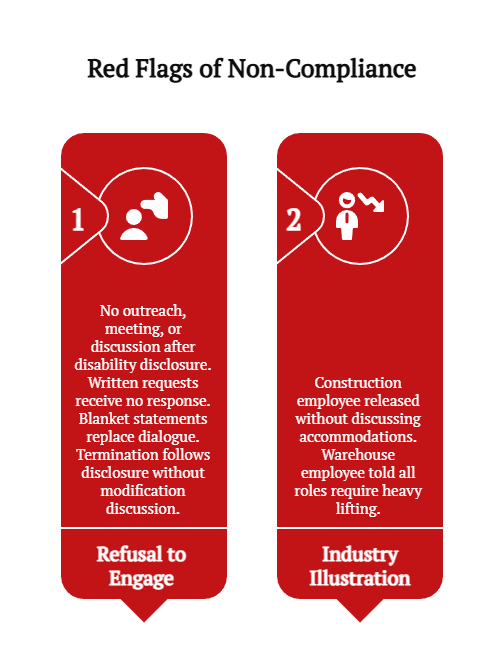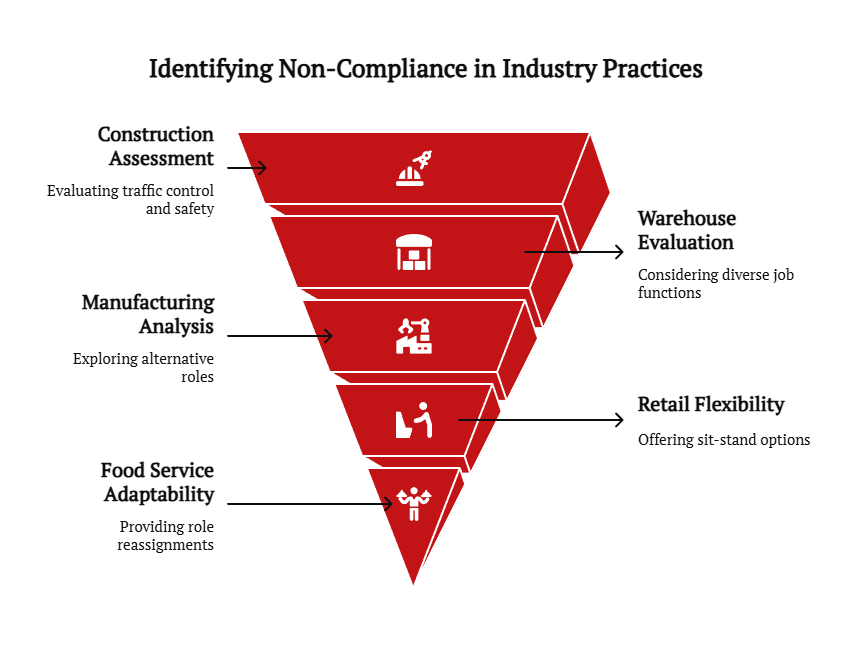📌 Key Takeaways
Know the signs of an illegal response when your employer learns about your disabilities due to bodily injuries.
- Silence Is a Signal: Your employer’s failure to engage in a timely conversation after you disclose a disability can be a direct violation of their legal duty.
- Good Faith Isn’t Optional: A brief, dismissive meeting or a quick “no” without exploring alternatives fails the legal requirement for a genuine, good-faith dialogue.
- Policies Don’t Invalidate People: A company’s blanket statement like “we don’t offer light duty” is not a valid substitute for an individualized assessment of your specific needs.
- A Request for an Accommodation Is Protected Activity: Any punitive action, like sudden poor reviews or suspensions following your request for an accommodation for your disability, can be considered illegal retaliation.
Recognizing these patterns is the first step in protecting your rights.
These insights are for any California employee in a physical role—from construction and warehousing to retail and food service—who needs to understand if their employer is complying with the law after a workplace injury.
When an employer in California knows about a physical or other disability, and does not engage in a timely, good-faith interactive process, that conduct may signal a potential violation of the Fair Employment and Housing Act (FEHA). The most telling markers often include silence after disclosure, perfunctory meetings, an early “no” without exploring options, or adverse treatment following an accommodation request.
What the law generally requires—just enough to spot issues
Under Cal. Gov’t Code § 12940(n), employers generally must engage in an honest, iterative dialogue with an employee who may need reasonable accommodations due to a disability. Interactive process refers to the legally required conversation about potential adjustments; reasonable accommodation means job or workplace changes that may enable performance despite limitations; good faith means a genuine—not superficial—effort to explore feasible options. Common injuries in physical roles—back, shoulder, knee, or leg conditions that limit lifting, reaching, standing, or walking—can qualify as disabilities when they substantially limit major life activities. If the employer knew of a disability and a potential need to provide an accommodation, the duty to engage in the good faith interactive process may be triggered.
Red flags that may indicate non-compliance

These patterns appear in construction, warehouse/logistics, manufacturing, retail, food service, landscaping, and delivery roles across Southern California. Examples are illustrative and not exhaustive.
1) Complete refusal to engage
- The disclosure of a disability, and a request for an accommodation is met with no outreach, meeting, or discussion.
- A written accommodation request receives no response.
- Blanket statements—“we don’t do light duty,” “this job requires full capacity”—replace individualized dialogue.
- Termination follows shortly after disclosure without discussion of potential modifications.
Industry illustration: A construction employee who cannot lift heavy materials but could perform safety observation, traffic control, or tool management is released without any discussion of how his disability can be accommodated. A warehouse employee returning with a 20-pound lifting limit is told “all roles require 50 pounds,” and no scanning, packing, or dispatch roles are considered.
2) Bad-faith or “sham” participation
- A brief single meeting ends with “no accommodations available” and no alternatives.
- Specific ideas (e.g., stool, schedule adjustment, different station) are dismissed without analysis.
- Requests for sweeping, unrelated medical records become a barrier.
- An “interactive” meeting is scheduled when termination appears already decided.
Industry illustration: A manufacturing employee proposes waist-level assembly work to avoid overhead reaching; management says it will “look into it,” then provides no follow-up and ends employment shortly thereafter.
3) Premature end to the dialogue
- “Undue hardship” is asserted without specifics or supporting information.
- Communication stops; the worker is later terminated for inability to perform.
Industry illustration: A landscaping employee who cannot operate heavy mowers but can perform trimming, planting, and maintenance is told “mowing is essential,” with no exploration of task redistribution among the crew.
4) Adverse treatment after a protected request (retaliation)
- New or intensified write-ups emerge soon after a request for accommodation.
- Scheduling turns punitive (e.g., only closing shifts or weekends) or assignments become atypically burdensome.
- Remarks suggest the worker “may not belong here” after limitations are disclosed.
- Pressure to resign replaces meaningful discussion.
Retaliation protections are set out in Cal. Gov’t Code § 12940(h). A request for accommodation is protected activity; adverse action closely following that request may support the inference of a causal connection.
Note on documentation: Employers may request medical information that is job-related and consistent with business necessity; excessive demands for broad records beyond a diagnostic and clinical evaluation relevant to restrictions can raise concerns in context.
Industry-specific patterns that often matter (including but not limited to)

- Construction: “No light duty” without assessing traffic control, site administration, tool inventory, safety observation, or equipment maintenance suggests the assessment may not be individualized.
- Warehouse/Logistics: “All jobs require heavy lifting” overlooks scanning, packing, quality control, inventory management, or dispatch functions.
- Manufacturing: “The line can’t change” is not analysis by itself; alternative stations, ergonomic equipment, or inspection roles may exist.
- Retail: Refusal of sit-stand options, cashier reassignment, or modest schedule adjustments for therapy may indicate non-compliance.
- Food Service: Refusal to consider host/cashier/prep reassignment or shorter shifts can be problematic when such roles exist.
Why these patterns may be legally significant
Failure to engage in, continue, or conduct in good faith the interactive process may violate FEHA and can support theories of disability discrimination and wrongful dismissal. The ultimate assessment depends on specific facts, available roles, functional limitations, and whether any accommodation would be effective without undue hardship. The trier of fact evaluates evidence and context; outcomes are rarely absolute.
Conclusion:
- When an employer knows about work-related limitations, the duty to engage in a good-faith interactive process may be triggered.
- Silence, a cursory meeting, an early blanket “no,” or adverse treatment after a request are common warning signs.
- Undue hardship is a specific, supported showing—not a generic refusal.
- Proceeding without professional guidance may affect the protection of legal rights.
Disclaimer:
This content is for informational purposes only. Laws, definitions, and deadlines change. Verify current requirements through official California sources. This content is not legal advice. No attorney-client relationship is formed through this content. Please consult a qualified attorney in your jurisdiction for legal advice specific to your situation.
Protect Your Rights | The Akopyan Law Firm, A.P.C. | Top Gun Employment Lawyers
Have you been wrongfully terminated from your job? Have you suffered discrimination, harassment, or retaliation in the workplace? Has your employer violated wage and hour laws? If so, we can help. The Akopyan Law Firm, A.P.C. is dedicated to protecting and enforcing employees’ rights throughout Southern California. With a 97% success rate and millions recovered for our clients, our team of experienced and talented employment lawyers can fight to secure the justice you deserve.
Take the First Step Towards Securing Justice: Call us today to speak with one of our experienced employment lawyers. The firm offers case evaluations free of charge.
Contact Us Today:
- Phone: (818) 509-9975
- Office Locations: Los Angeles, Bakersfield, Costa Mesa, Temecula, Rancho Cucamonga, Oxnard, Culver City, and San Diego in California.
Important: Contacting the Akopyan Law Firm, A.P.C. does not create an attorney-client relationship, but all communications will remain private and confidential. Each case is unique. The Akopyan Law Firm, A.P.C., does not guarantee any outcome.

